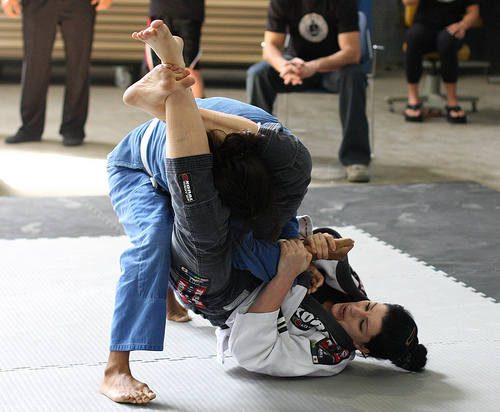Guest post by Evolve MMA, Asia’s premier championship brand for martial arts. It has the most number of World Champions on the planet. Named as the #1 ranked martial arts organization in Asia by CNN, Yahoo! Sports, FOX Sports, Evolve MMA is the top rated BJJ gym in Singapore.
When Brazilian Jiu-Jitsu (BJJ) practitioners decide that they want to test their skills in a competition setting for the first time, it can be quite daunting to figure out the best way to prepare. There is a multitude of factors that can affect whether the first competition results in a great experience or an unpleasant one. The first competition can be quite intimidating, as the pressure and anxiety can overshadow the main reason you signed up in the first place, to have fun and test your BJJ skills. In an attempt to help you prepare for your competitive debut, we have put together a guide covering the do’s and don’ts of your preparation. By taking the following steps, you will set yourself on a path to having your first tournament be a successful and ultimately rewarding experience.
Pick The Right Competition
Back in the early days of Brazilian Jiu-Jitsu when the sport was still relatively obscure, practitioners did not have the luxury of being able to select from a wide option of competitions. Because the sport had yet to undergo its explosion in popularity, the selection of competitions to choose from was incredibly narrow. This meant that competitors couldn’t be picky about which competitions they chose to attend. Fortunately, this is not the case nowadays, as you have a plethora of options to choose from, allowing you to select the choice that will make you the most comfortable.
When preparing for your first competition, perhaps the most important precaution you can take to ensure a good experience is to select the event that is the best fit. There are several factors that go into making sure a competition is “right” for you, including size, place, ruleset, and organization. While it might be tempting to select the next upcoming IBJJF championship to make your debut, the jam-packed university gymnasium filled with screaming coaches and spectators will certainly add to the pre-competition nerves. If you are nervous about competing for the first time, foregoing this in favor of a smaller, local competition will help mitigate anxiety and build your confidence.
Along with picking a competition that is an appropriate size and intensity, you should also make sure that the ruleset is one you are comfortable with. If you are a relative novice grappler who has been training in the gym with a particular ruleset, you should make every effort to find a competition that uses that ruleset. While “submission only” or “all submissions are legal” tournaments are a great way to test your skills in an exciting format, a standard IBJJF ruleset is strongly suggested for those who have been training under those rules in the gym.
Pick The Right Weight Class
One of the biggest mistakes a novice competitor can make is to try to cut excessive amounts of weight in an attempt to qualify for the lowest weight class possible, a miscalculation that can sabotage your competition performance before you even register. While weight cutting can lead to success if done under the supervision of a highly trained nutritionist, it is not an approach that a first-time competitor should take.
The theory that being in a lower weight class will lead to greater success is not necessarily true, as the lower weight comes with a significant trade-off to your performance. Drastic changes to food and water intake have an effect on the body that is sure to make you feel much weaker and constantly exhausted. Instead of attempting to lose a significant portion of weight in a short amount of time, a much better option would be to attempt to shed excess pounds in the months leading up to the event through gradual reduction in caloric intake, but only if you are going to be at a healthy weight on the day you compete. Competing against lighter opponents is not going to lead to better results if you are too depleted to perform at your best. Instead, it is much more effective to put the effort that would be wasted on weight cutting into practicing your technique so that you can show up prepared and healthy on the day of the competition.
Have A Game Plan
While the advice to “have a game plan” sounds like standard competitive encouragement, in actuality, it is crucial instruction that can greatly improve your competitive chances. While it is understandable why it is often disregarded as trivial, the importance of having a game plan should be thoroughly internalized, especially when preparing for your first competitive outing.
Essentially, “to have a game plan” means that you have made a calculated decision about what you believe to be your most likely path to victory. Are you going to try for a takedown, or pull guard? If you are pulling guard, are you going to try to finish your opponent off of your back or sweep to a dominant position? Your game plan should center around utilizing your most proficient techniques and skills, as well as avoiding your opponent’s strengths and exploiting his/her weaknesses.
While it is perfectly acceptable to stay flexible in the course of a match, changing tactics as you see fit, you should always enter a bout with a clear and concise game plan that you believe will give you the best chance to beat your opponent.
Know The Basics Of Every Position
A strong rule of thumb to tell whether or not a novice BJJ practitioner is ready for their first competition is if they can utilize at least one technique from every major position. This is not to say that you have to have mastered these techniques, just that you are knowledgeable of the mechanics of each position and are aware of how to attack or defend from whatever situation you are forced into.
For example, you should know at least one escape from bottom side control, bottom mount, and back control, while knowing at least one attack from each dominant position and a handful of guard sweeps and passes. Making sure you possess this knowledge prior to entering a competition will prevent your coach from having to teach you how to escape or attack in the midst of a match, which is certainly not ideal.
If you are not familiar with the basics of every position, that is perfectly okay! You’ll have time to study and practice before you compete, so there is no need to panic. Identify which positions you lack adequate knowledge of and ask your coach to help you remedy the issue. By making sure you understand the fundamentals of every position, you will be able to avoid feeling hopeless in the midst of a match, leading to a much better competitive result.
While competing for the first time certainly can be anxiety provoking, it does not have to be. By taking the steps outlined here, you are sure to be properly prepared to enter your first competition healthy and confident. Remember, this should be an enjoyable experience, so relax and have fun!


















